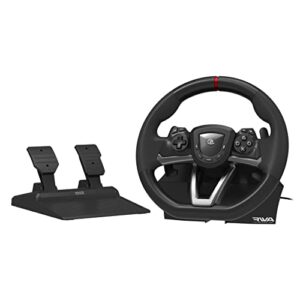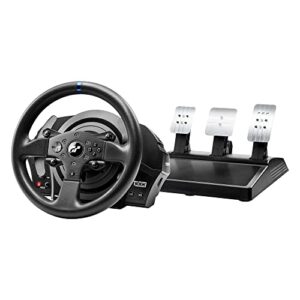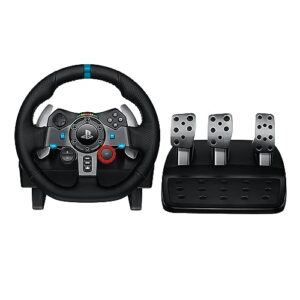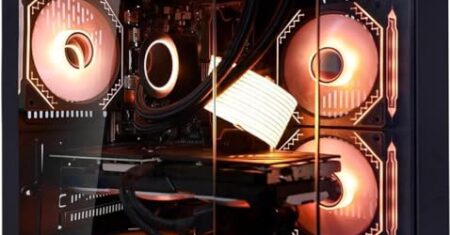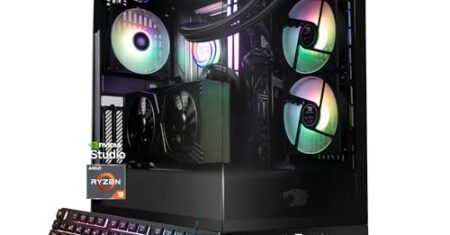Best Gaming Monitors in 2025 (Top 9: ASUS, LG and More)
Find the perfect display for your setup. Discover the best gaming monitors with high refresh rates, low response times, and stunning visuals to elevate your gameplay.
You deserve a monitor that makes every frame count.
Lag ruins clutch moments. Dull color ruins immersion. You want speed and stunning visuals, without headache.
Whether you chase ranked wins or lose yourself in single‑player worlds, the right screen changes how games feel. This roundup cuts through specs and shows the monitors that actually deliver.
Contents
- The Best Gaming Monitors
- ASUS ROG Swift 27" QHD OLED 240Hz
- LG UltraGear 27" QHD IPS 144Hz Monitor
- ASUS TUF 27" 280Hz Fast IPS Monitor
- AOC C27G2Z 27" 240Hz Curved Gaming Monitor
- Samsung Odyssey G55C 32" QHD Curved
- Sceptre 34" Curved Ultrawide WQHD Monitor
- Acer Nitro 23.8" 165Hz VA Monitor
- KOORUI 24" 200Hz Fast IPS Monitor
- KTC 24" Fast IPS 190Hz Gaming Monitor
- Final Thoughts on the Best Gaming Monitors
- What’s the Difference Between a Regular Monitor and a Gaming Monitor?
- How to Choose the Best Gaming Monitor
- 1. Match the Monitor to Your Daily Use
- 2. Choose the Right Panel Type: IPS, VA, or TN
- 3. Check for DisplayPort on High-Refresh Monitors
- 4. Consider Resolution: Full HD, QHD, or 4K
- 5. Built-in Speakers Can Add Value
- Check Out the Best Gaming Monitors
- Also Check Out Other Helpful Articles
- Video About the Best Gaming Monitors
The Best Gaming Monitors









ASUS ROG Swift 27" QHD OLED 240Hz
You’ll experience true blacks, vivid colors, and blistering responsiveness with a 240Hz QHD OLED and near-instant 0.03ms response. It’s an excellent choice if you want both elite competitive performance and superior image quality.
Pros
- QHD OLED panel with true blacks and infinite contrast
- 240Hz refresh and 0.03ms response for ultimate motion clarity
- 99% DCI-P3 and true 10-bit color for rich visuals
- Advanced cooling and burn-in mitigation for OLED longevity
Cons
- High price relative to LCD alternatives
- OLED still requires careful use to minimize burn-in risk
Why this stands out
This ROG Swift OLED combines OLED’s unrivaled contrast and color depth with a 240Hz refresh rate and ultra-fast response. It targets gamers and creators who demand both picture quality and competitive-level speed.
Benefits and performance details
OLED delivers true blacks because pixels can turn off completely, which gives you amazing HDR depth and shadow detail in dark scenes. Coupled with 240Hz and a 0.03ms response, fast-paced titles look incredibly smooth and remain artifact-free when paired with adaptive-sync technologies.
- QHD (2560 x 1440) OLED panel with true 10-bit color
- 240Hz refresh rate, 0.03ms response, and G-SYNC compatibility
- Custom heatsink and voltage optimization to reduce burn-in risk
Practical insights and care
To protect longevity, use varied content and enable any built-in pixel-shifting or screen-protection features. If you primarily play competitive shooters but also value cinematic single-player visuals, this monitor uniquely satisfies both use cases. Expect to pay a premium, but the visual and performance gains are significant if you can justify the cost.
LG UltraGear 27" QHD IPS 144Hz Monitor
You get a highly balanced 27" 1440p IPS monitor that blends accurate color, G-SYNC compatibility, and a 144Hz refresh for both competitive and creative work. It’s a reliable choice if you need versatility without compromise.
Pros
- QHD IPS panel with accurate colors and wide viewing angles
- 144Hz refresh and 1ms (GtG) response for smooth gameplay
- G-SYNC Compatible and FreeSync support
- Adjustable ergonomic stand and near-borderless bezels
Cons
- Not as fast as 240Hz/280Hz competitive monitors
- IPS glow can appear in dark scenes at certain angles
Overview and who will like it
This LG UltraGear strikes an excellent balance between gaming performance and color fidelity, making it suitable if you play games but also do photo/video editing or general productivity. The 27" QHD IPS panel is a sweet spot for pixel density and performance.
Key strengths you’ll notice
Colors are accurate and stable across viewing angles thanks to the IPS panel, and 144Hz gives you a noticeable responsiveness improvement over 60Hz. G-SYNC compatibility smooths gameplay with supported GPUs, while the adjustable stand helps you set a comfortable, ergonomic workstation.
- 27" QHD (2560 x 1440) IPS panel with 99% sRGB coverage
- 144Hz refresh, 1ms (GtG) response, NVIDIA G-SYNC Compatible
- Tilt/height/pivot adjustable stand and 3-side virtually borderless bezel
Practical tips and potential limitations
If top-tier competitive edge is your only goal, a 240Hz+ monitor will feel faster—but you’ll trade off resolution or color depth. IPS glow is a normal characteristic on darker scenes; calibrate brightness and contrast to minimize perceived glow. For most users who mix gaming and creative work, this monitor delivers an excellent all-around experience.
ASUS TUF 27" 280Hz Fast IPS Monitor
You’ll notice extreme fluidity with an overclockable 280Hz refresh and Fast IPS color performance that keeps visuals accurate and quick. It’s tuned for competitive play while remaining a solid all-around monitor for modern games.
Pros
- Overclockable to 280Hz for ultra-smooth motion
- Fast IPS panel with 100% sRGB color coverage
- ELMB Sync + AdaptiveSync reduces ghosting and tearing
- Solid build with good ergonomics and connectivity
Cons
- 1080p resolution on 27" may not suit productivity users
- High refresh advantages require a very capable GPU
Who should buy this
If you're competitive or take FPS titles seriously, this ASUS TUF 27" monitor is built to give you an edge. It combines extreme refresh rates with technologies aimed at minimizing blur and tearing so you can track targets more precisely.
Performance and features
The Fast IPS panel gives you quicker pixel transitions than standard IPS and preserves color accuracy, while the 280Hz overclock option makes motion exceptionally smooth. ASUS’s ELMB Sync lets you run low-persistence motion blur reduction together with variable refresh to keep motion crisp without tearing.
- 27" Full HD Fast IPS panel with up to 280Hz refresh
- ELMB Sync + FreeSync Premium and G-SYNC compatibility
- HDR support, speakers, and variable overdrive for tuning
Practical advice and trade-offs
You’ll need a high-frame-rate capable PC to fully exploit 280Hz—this monitor is most beneficial at high FPS. If you also need screen real estate for editing or multi-window work, consider a 1440p panel instead. For competitive gaming though, the feel and responsiveness are top-tier and worth the investment.
AOC C27G2Z 27" 240Hz Curved Gaming Monitor
You’ll get blistering 240Hz performance with an aggressive 0.5ms MPRT response on a 27" curved screen, which is rare at this price. The monitor is a great choice if you want ultra-smooth gameplay without a premium investment.
Pros
- 240Hz refresh rate and 0.5ms MPRT for minimal motion blur
- 1500R curve increases immersion
- FreeSync support and console ready
- Ergonomic stand with height adjustment and VESA mountable
Cons
- 1080p resolution at 27" reduces pixel density
- VA panel color/angle performance may lag behind IPS
Overview and target user
This AOC C27G2Z is built for gamers who want extreme smoothness and responsiveness on a curved 27" display without paying flagship prices. It’s ideal if you play fast-paced shooters or competitive titles and want the advantage of higher refresh.
Key features and day-to-day benefits
With 240Hz and a 0.5ms MPRT, fast motion appears exceptionally clear and input feel is tight. The 1500R curve enhances immersion for racing, over-the-shoulder, and first-person titles. AOC includes useful gaming modes and an ergonomic stand so you can tune your setup for comfort during long sessions.
- 27" FHD curved VA panel with 240Hz refresh
- 0.5ms MPRT response and AMD FreeSync support
- 3-sided frameless design and height-adjustable stand
Things to keep in mind
At 27" the 1080p pixel density isn’t as sharp as 1440p alternatives, so if clarity for text or fine details matters, consider a higher-resolution model. The panel is tuned for motion and contrast, which makes it excellent for gaming but slightly less ideal for color-critical photo or video work. If you want to maximize refresh, use DisplayPort and ensure your GPU can drive high FPS at 1080p.
Samsung Odyssey G55C 32" QHD Curved
You’ll benefit from a 32" QHD panel with a tight 1000R curvature that increases immersion and focus across games and media. The monitor blends a high pixel density and worthwhile gaming features for versatile use.
Pros
- 32" QHD (2560 x 1440) for sharper images
- 1000R curvature wraps your field of view
- 165Hz refresh and 1ms MPRT response
- Good build quality and Samsung image processing
Cons
- VESA mounting positions may be unconventional for some arms
- Limited input count compared to some competitors
Who benefits most
This Samsung Odyssey G55C is suited to gamers and multitaskers who want a larger, sharper display with strong immersion. The 32" QHD resolution delivers more detail than 1080p while the 1000R curve makes content feel enveloping.
Strengths in real-world use
You’ll see crisper textures and more screen space for maps, HUDs, and productivity windows thanks to 2560 x 1440 resolution. The 165Hz refresh paired with 1ms MPRT makes for responsive gameplay, and the deep curve helps reduce eye movement across the panel when you’re focused on action near the edges.
- 32" QHD curved (2560 x 1440) with 1000R curvature
- 165Hz refresh rate and 1ms MPRT response
- HDR10, Eye Care features, and FreeSync support
Notes and setup tips
Be aware of the monitor’s connector layout and VESA placement when choosing an arm or mount; you may need a taller arm or slightly different bracket. If you play older titles that don’t support ultrawide or curved modes well, expect letterboxing or stretched images; modern games generally handle the aspect nicely.
Sceptre 34" Curved Ultrawide WQHD Monitor
You’ll enjoy a spacious 34" 3440x1440 curve that wraps your view and improves immersion in single-player and racing games. The high refresh rate and 1500R curvature make it a great productivity and entertainment screen for the price.
Pros
- 34" WQHD ultrawide (3440 x 1440) for expanded view
- 1500R curvature increases immersion
- Up to 165Hz refresh and 1ms MPRT
- Multiple DisplayPort and HDMI inputs
Cons
- Ultrawide support varies across games; some titles need manual aspect adjustments
- Panel blacks and HDR performance are modest at this price
Who this monitor fits
If you want a single display to replace a dual-monitor setup or to increase immersion in racing and simulation games, this 34" curved WQHD monitor is a solid, cost-conscious pick. It blends productivity real estate with gaming-focused refresh rates.
Strengths and usability
The 3440 x 1440 resolution gives you significantly more horizontal workspace for editing timelines, spreadsheets, and tactical game HUDs. The 1500R curvature is noticeable in making peripheral content feel more natural and immersive, while the up-to-165Hz refresh keeps motion smooth in supported titles.
- 34" ultrawide WQHD panel (3440 x 1440)
- 1500R curvature, 1ms MPRT, up to 165Hz refresh
- AMD FreeSync Premium and built-in speakers
Considerations and practical tips
Not all games perfectly support 21:9; you may need to enable ultrawide modes or accept letterboxing in a few titles. The monitor is very good for movies and productivity but if you want top-tier HDR or inky blacks, a higher-end display will be superior. Use the wide screen for split-view workflows — you can have a browser, chat, and game window visible simultaneously without extra monitors.
Acer Nitro 23.8" 165Hz VA Monitor
You get a high-refresh, low-latency panel that prioritizes smooth competitive play without breaking the bank. It balances solid motion handling and useful gaming features for entry-level to mid-range systems.
Pros
- 165Hz refresh rate with 1ms VRB response
- AMD FreeSync Premium reduces tearing
- Compact ZeroFrame design is multi-monitor friendly
- Comfort features: flicker-less, low dimming, ComfyView
Cons
- VA panel contrast can cause slower pixel transitions vs IPS
- 1080p resolution on 24" may show less detail for productivity
Who this is for
You should consider this monitor if you want a budget-friendly gaming display that focuses on refresh rate and smoothness rather than maximum resolution. It’s designed for competitive and casual gamers who run at 1080p and want higher frame rates without spending a lot.
Key strengths and everyday benefits
The KG241Y brings a 165Hz refresh and 1ms VRB motion clarity to a compact 23.8" VA panel. That combo gives you responsive visuals in fast shooters and esports titles while keeping input lag low. You’ll also appreciate space-saving features if you run multiple monitors or have a small desk.
- 23.8" Full HD (1920 x 1080) VA panel
- 165Hz refresh rate and 1ms VRB response time
- AMD FreeSync Premium support and HDR Ready
Practical considerations and limitations
Because it uses a VA panel, you’ll get stronger contrast than some IPS alternatives, but you may notice slightly slower gray-to-gray transitions in very fast scenes. The 1080p resolution is ideal for high frame rates, but if you also want screen real estate for content creation or large spreadsheets, a higher-resolution option will serve you better.
Final usage tips
If you prioritize competitive performance on a modest GPU, this monitor is a sensible choice: run games at 1080p to hit higher FPS and enable FreeSync for smoother play. If you want richer colors or wider viewing angles for media work, consider an IPS or higher-resolution model instead.
KOORUI 24" 200Hz Fast IPS Monitor
You get an ultra-fast 200Hz Fast IPS panel with a 1ms response and broad color coverage for vivid gameplay. It’s a strong pick if you want a fast, bright 24" screen without premium pricing.
Pros
- 200Hz refresh for smoother motion
- Fast IPS provides good color and wider viewing angles
- HDR400 and 90% DCI-P3 color gamut
- Slim bezel and VESA mountable for multi-monitor setups
Cons
- 200Hz may require DisplayPort for full bandwidth on some systems
- HDR400 on smaller panels can be limited compared to higher-tier HDR
Overview
This KOORUI 24" monitor targets players who want very high refresh rates and good color reproduction without a big price tag. It combines a Fast IPS panel with 200Hz performance and basic HDR support to appeal to both competitive and general gamers.
What you’ll notice in day-to-day use
The 200Hz refresh rate reduces motion blur and improves responsiveness in fast-paced games; paired with a 1ms pixel response this results in crisp aiming and perceived smoothness. The Fast IPS panel offers more consistent color and viewing angles than a VA at similar price points, making it better for content viewing or collaborative play.
- 24" FHD (1920 x 1080) Fast IPS panel
- 200Hz refresh rate and 1ms response time
- HDR400 certification and 90% DCI-P3 color gamut
Practical trade-offs and tips
HDR400 on a 24" monitor won’t match the brightness or local dimming of higher-end HDR displays, so HDR effects are modest. To take full advantage of 200Hz, use DisplayPort 1.4 and ensure your GPU can sustain high frame rates at 1080p. If you want deeper blacks or larger screen size, explore VA or ultrawide options.
KTC 24" Fast IPS 190Hz Gaming Monitor
You’ll get a fast Fast-IPS panel with HDR 400 and broad color coverage that makes games look vibrant. It’s a capable mid-range choice when you want high refresh rates and punchy color in a 24" form factor.
Pros
- Fast IPS panel with high refresh (up to ~190Hz)
- 133% sRGB / vivid color reproduction
- DisplayHDR 400 improves contrast and highlights
- Multiple video inputs (HDMI x2, DP x1)
Cons
- Brand recognition and long-term support may vary
- Some units may require color calibration out of box
Who should consider it
Choose this KTC 24" monitor if you want fast motion handling and color punch in a compact package. It’s aimed at gamers who value both responsiveness and a lively image without spending on flagship hardware.
Key features and benefits
The FAST IPS panel gives you quick pixel response and wide viewing angles, while the high refresh capability (190Hz/180Hz depending on mode) makes competitive play feel fluid. The extended color gamut helps deliver more saturated, engaging visuals for modern games and media.
- 24" FHD Fast IPS with up to 190Hz refresh
- 133% sRGB color coverage and DisplayHDR 400
- AdaptiveSync and 1ms response time for competitive play
Limitations and tips
HDR400 is entry-level and won’t match high-tier HDR panels, so expect modest dynamic range gains. If color-critical work matters, calibrate the monitor with a colorimeter. For gaming, prefer DisplayPort for the most reliable high-refresh performance and to unlock the maximum Hz supported by the panel.
Final Thoughts on the Best Gaming Monitors

Pick the ASUS ROG Swift 27" QHD OLED 240Hz if you want the absolute best: elite competitive speed with a 240Hz panel, near‑instant 0.03ms response, and OLED contrast and color that make games pop. It’s the top choice when you demand both blistering performance and superior image quality.
Choose the LG UltraGear 27" QHD IPS 144Hz if you need a reliable, versatile daily driver. It balances accurate color, G‑SYNC compatibility, and smooth 144Hz performance—ideal when you split time between competitive play and creative or color‑sensitive work.
What’s the Difference Between a Regular Monitor and a Gaming Monitor?
The main difference between a standard monitor and a gaming monitor lies in refresh rate and response time. Gaming monitors typically deliver higher refresh rates and faster response times, resulting in smoother motion and reduced blurring.
While most regular monitors are limited to 60Hz, gaming models often reach 144Hz or even 240Hz. In terms of response time, standard monitors may sit around 4ms or higher, while gaming monitors can go as low as 0.5ms to 1ms. This makes a huge difference in fast-paced games where every millisecond counts.
Many gaming monitors also come with extra features designed for performance, such as crosshair overlays, black equalizer settings for better visibility, and adaptive technologies that reduce screen tearing.
How to Choose the Best Gaming Monitor
When shopping for the best gaming monitors, it’s important to look beyond design and price. Key aspects like size, resolution, refresh rate, response time, and panel technology will directly impact your gaming experience. Here are the main factors to consider:
1. Match the Monitor to Your Daily Use
If your main focus is gaming, prioritize higher refresh rates and low response times. For casual gaming, a 75Hz model may be enough. However, for competitive or fast-action titles, consider at least 120Hz, 144Hz, or even 240Hz.
A quick response time, ideally around 0.5ms to 1ms, minimizes input lag and motion blur. Features like Adaptive Sync are also essential to prevent screen tearing. Extra gaming modes, crosshair functions, and black equalizer tools further enhance gameplay, especially in competitive matches.
For work and light gaming, a 75Hz monitor with a 1ms response time is often sufficient. Eye-care technologies like Flicker-Free or Blue Light reduction can also help reduce fatigue during long sessions.
2. Choose the Right Panel Type: IPS, VA, or TN
The panel type affects color accuracy, viewing angles, and overall performance.
- IPS Panels: Deliver excellent color accuracy and wide viewing angles. Ideal for both gaming and creative work.
- VA Panels: Provide strong contrast and deep blacks, great for immersive visuals. Best viewed directly from the front.
- TN Panels: Offer very fast response times and are often cheaper, but colors and viewing angles are limited.
For the best gaming monitors, IPS and VA panels are highly recommended. If you also work with design or media, IPS is the superior choice.
3. Check for DisplayPort on High-Refresh Monitors
Connection options matter. HDMI and VGA are common, but if you’re buying a monitor with 144Hz or higher refresh rates, DisplayPort is essential. It provides faster data transfer and ensures you get the full benefit of your monitor’s capabilities.
Make sure your graphics card supports DisplayPort. For additional flexibility, some monitors also include USB hubs, headphone jacks, and multiple HDMI inputs.
4. Consider Resolution: Full HD, QHD, or 4K
Resolution determines image sharpness.
- Full HD (1920x1080): Standard for most gaming monitors. Affordable and widely supported.
- QHD (2560x1440): A sweet spot between performance and image clarity.
- 4K (3840x2160): Offers stunning visuals and sharp details but requires a powerful graphics card to maintain smooth frame rates.
For competitive gamers, higher refresh rates often matter more than ultra-high resolution. For those who want breathtaking visuals, 4K gaming monitors deliver the best image quality.
5. Built-in Speakers Can Add Value
While many gaming monitors skip built-in speakers, some models include them as a convenience. This can save you from needing separate speakers or a headset, making the monitor a more cost-effective option.
However, built-in speakers usually don’t match the quality of dedicated audio gear. Serious gamers and professionals will likely still prefer headsets or external speakers for better sound performance.
Check Out the Best Gaming Monitors
Still not sure which one to choose? Click the link below to see the best-selling products.
Also Check Out Other Helpful Articles
Take a look at more useful articles that can help you make more informed decisions.
- Best PS4 Accessories in 2025 (Top 9: HORI, eXtremeRate, and More)
- Best Racing Wheels For PC in 2025 (Top 8: Logitech G920, Numskull and More)
- Best Racing Wheels For PS4 in 2025 (Top 9: Logitech G29, Thrustmaster F1 and More)
Video About the Best Gaming Monitors
We created a video on the topic. Just click to watch.
About the Author
